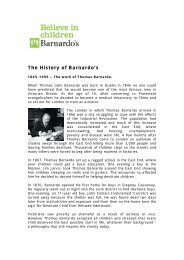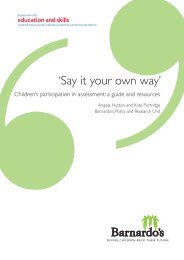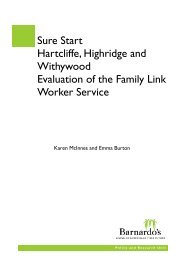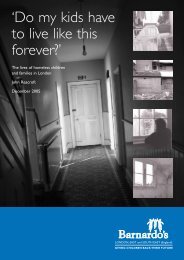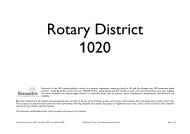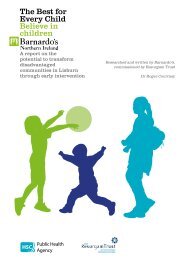Splintered Lives - Barnardo's
Splintered Lives - Barnardo's
Splintered Lives - Barnardo's
Create successful ePaper yourself
Turn your PDF publications into a flip-book with our unique Google optimized e-Paper software.
PAGE 64<br />
chapter<br />
10<br />
Formal responses to<br />
sexual exploitation of children<br />
British legislation<br />
There is a long tradition of responses to child prostitution in Britain; it was an issue<br />
addressed by 'first wave' feminists, child welfare and philanthropic organisations in the<br />
nineteenth century. Whilst prostitution and trafficking were major concerns, the issue of<br />
child pornography was less central, primarily due to its (then) lesser prevalence. These<br />
earlier responses combined campaigns for legislative reform and law enforcement with<br />
education and 'rescue' services.<br />
How to respond to both prostitution and pornography is a contested issue in relation to<br />
adults, and many of these debates have resonances in relation to responses to children.<br />
A range of organised (and semi-organised) interest groups have stakes in this issue,<br />
including:<br />
�� producers/organisers and customers who support minimal restrictions;<br />
�� sex industry workers who resent the way they are criminalised and policed;<br />
�� sexual libertarians who view any legal restrictions as an invasion of personal<br />
freedom;<br />
�� feminists who view the sex industry as both predicated upon, and reproducing,<br />
women and children's oppression;<br />
�� fundamentalist religious groups who view explicit sexuality outside of formal<br />
heterosexual unions as a threat to religious values.<br />
Only a minority of those supporting minimal restrictions apply this to children, instead<br />
arguing that there are different issues involved here. The distinction is, however, not<br />
that simple, since many adults currently working in the sex industry entered as<br />
children/young people. At what point, and for what reasons can we say that individuals<br />
are in a context where they are able to take adult decisions, uncontaminated by past<br />
experiences? As adults, as well as children, they may have no realistic alternatives.<br />
In recent debates regarding adult pornography it has been suggested that current<br />
assault and sexual offenses legislation should be sufficient to cover the coercive aspects<br />
of production (see, for example, Assiter and Carol, 1993). This would clearly not cover<br />
child pornography as such, since there is currently no act defined as an offence outside<br />
legislation on pornography. Whilst current sexual offenses legislation might apply to<br />
child prostitution, evidence we presented earlier demonstrates that it is not being<br />
enforced in this way.<br />
The history of recent British legislation on child pornography begins with Section 1 of the<br />
Protection of Children Act 1978 which specifies several offenses:




